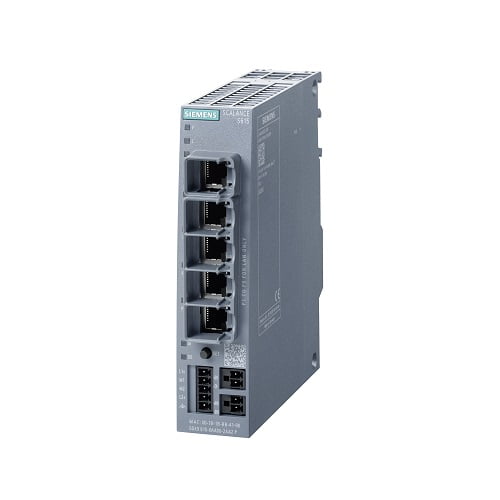1. EXECUTIVE SUMMARY
- CVSS v3 7.2
- ATTENTION: Exploitable remotely/low attack complexity
- Vendor: Siemens
- Equipment: SCALANCE M-800/S615 Family
- Vulnerabilities: Acceptance of Extraneous Untrusted Data With Trusted Data, OS Command Injection
2. RISK EVALUATION
Successful exploitation of these vulnerabilities could allow an attacker with administrative privileges to execute arbitrary code on the affected device.
3. TECHNICAL DETAILS
3.1 AFFECTED PRODUCTS
The following products of Siemens, are affected:
- RUGGEDCOM RM1224 LTE(4G) EU (6GK6108-4AM00-2BA2): All versions prior to V7.2.2
- RUGGEDCOM RM1224 LTE(4G) NAM (6GK6108-4AM00-2DA2): All versions prior to V7.2.2
- SCALANCE M804PB (6GK5804-0AP00-2AA2): All versions prior to V7.2.2
- SCALANCE M812-1 ADSL-Router (Annex A) (6GK5812-1AA00-2AA2): All versons prior to V7.2.2
- SCALANCE M812-1 ADSL-Router (Annex B) (6GK5812-1BA00-2AA2): All versions prior to V7.2.2
- SCALANCE M816-1 ADSL-Router (Annex A) (6GK5816-1AA00-2AA2): All versions prior to V7.2.2
- SCALANCE M816-1 ADSL-Router (Annex B) (6GK5816-1BA00-2AA2): All versions prior to V7.2.2
- SCALANCE M826-2 SHDSL-Router (6GK5826-2AB00-2AB2): All versions prior to V7.2.2
- SCALANCE M874-2 (6GK5874-2AA00-2AA2): All versions prior to V7.2.2
- SCALANCE M874-3 (6GK5874-3AA00-2AA2): All versions prior to V7.2.2
- SCALANCE M876-3 (EVDO) (6GK5876-3AA02-2BA2): All versions prior to V7.2.2
- SCALANCE M876-3 (ROK) (6GK5876-3AA02-2EA2): All versions prior to V7.2.2
- SCALANCE M876-4 (6GK5876-4AA10-2BA2): All versions prior to V7.2.2
- SCALANCE M876-4 (EU) (6GK5876-4AA00-2BA2): All versions prior to V7.2.2
- SCALANCE M876-4 (NAM) (6GK5876-4AA00-2DA2): All versions prior to V7.2.2
- SCALANCE MUM853-1 (EU) (6GK5853-2EA00-2DA1): All versions prior to V7.2.2
- SCALANCE MUM856-1 (EU) (6GK5856-2EA00-3DA1): All versions prior to V7.2.2
- SCALANCE MUM856-1 (RoW) (6GK5856-2EA00-3AA1): All versions prior to V7.2.2
- SCALANCE S615 (6GK5615-0AA00-2AA2): All versions prior to V7.2.2
- SCALANCE S615 EEC (6GK5615-0AA01-2AA2): All versions prior to V7.2.2
3.2 Vulnerability Overview
3.2.1 ACCEPTANCE OF EXTRANEOUS UNTRUSTED DATA WITH TRUSTED DATA CWE-349
Affected products do not properly validate the content of uploaded X509 certificates which could allow an attacker with administrative privileges to execute arbitrary code on the device.
CVE-2023-44317 has been assigned to this vulnerability. A CVSS v3 base score of 7.2 has been assigned; the CVSS vector string is (CVSS:3.1/AV:N/AC:L/PR:H/UI:N/S:U/C:H/I:H/A:H).
3.2.2 IMPROPER NEUTRALIZATION OF SPECIAL ELEMENTS USED IN AN OS COMMAND (‘OS COMMAND INJECTION’) CWE-78
An improper neutralization of special elements used in an OS command with root privileges vulnerability exists in the parsing of the IPSEC configuration. This could allow malicious local administrators to issue commands on system level after a new connection is established.
CVE-2023-49692 has been assigned to this vulnerability. A CVSS v3 base score of 7.2 has been assigned; the CVSS vector string is (CVSS:3.1/AV:N/AC:L/PR:H/UI:N/S:U/C:H/I:H/A:H).
3.3 BACKGROUND
- CRITICAL INFRASTRUCTURE SECTORS: Critical Manufacturing
- COUNTRIES/AREAS DEPLOYED: Worldwide
- COMPANY HEADQUARTERS LOCATION: Germany
3.4 RESEARCHER
Siemens reported these vulnerabilities to CISA.
4. MITIGATIONS
Siemens has identified the following specific workarounds and mitigations users can apply to reduce risk:
- Update to V7.2.2 or later version
As a general security measure, Siemens recommends protecting network access to devices with appropriate mechanisms. To operate the devices in a protected IT environment, Siemens recommends configuring the environment according to Siemens’ operational guidelines for industrial security and following recommendations in the product manuals.
For more information see the associated Siemens security advisory SSA-068047 in HTML and CSAF.
CISA recommends users take defensive measures to minimize the risk of exploitation of these vulnerabilities, such as:
- Minimize network exposure for all control system devices and/or systems, ensuring they are not accessible from the internet.
- Locate control system networks and remote devices behind firewalls and isolating them from business networks.
- When remote access is required, use more secure methods, such as Virtual Private Networks (VPNs). Recognize VPNs may have vulnerabilities, should be updated to the most recent version available, and are only as secure as the connected devices.
CISA reminds organizations to perform proper impact analysis and risk assessment prior to deploying defensive measures.
CISA also provides a section for control systems security recommended practices on the ICS webpage on cisa.gov. Several CISA products detailing cyber defense best practices are available for reading and download, including Improving Industrial Control Systems Cybersecurity with Defense-in-Depth Strategies.
CISA encourages organizations to implement recommended cybersecurity strategies for proactive defense of ICS assets.
Additional mitigation guidance and recommended practices are publicly available on the ICS webpage at cisa.gov in the technical information paper, ICS-TIP-12-146-01B–Targeted Cyber Intrusion Detection and Mitigation Strategies.
Organizations observing suspected malicious activity should follow established internal procedures and report findings to CISA for tracking and correlation against other incidents.
No known public exploitation specifically targeting these vulnerabilities has been reported to CISA at this time.
5. UPDATE HISTORY
- December 14, 2023: Initial Publication
This product is provided subject to this Notification and this Privacy & Use policy.
Source:


Stay connected